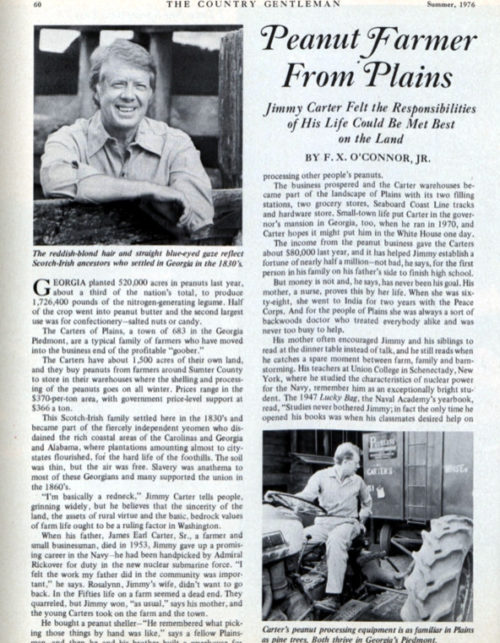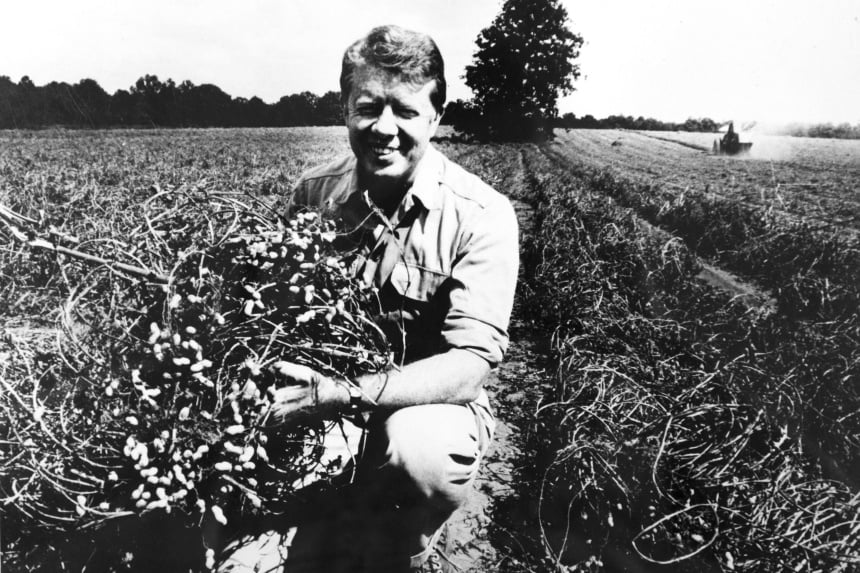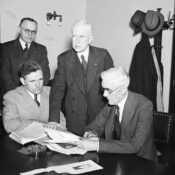Today marks the first time a U.S. president has ever turned 95 years old.
James Earl Carter, when he made his first run for the presidency in 1976, surprised many in the Democratic party by winning some key races in the early primaries. His “outsider” politics and small-town charm made Carter a refreshing candidate to many in a tumultuous political decade. After he lost his second bid for the White House, he and his wife Rosalynn went back to their peanut business in Plains, Georgia, where they still live today.
In a 1976 television ad, Carter emphasized his everyman image while describing his hope for a country recently rocked by scandal and corruption: “a president who feels your pain and who shares your dreams.” Images of pastoral American landscapes flashed across the screen in tandem with smiling American faces: a man in a hardhat, an African-American couple, a redheaded kid. Carter’s popularity among minorities and poor voters reflected his promises to bring honesty and competence back to national governance. His rural, agricultural background was an asset in so-called B and C counties (categorized at the time as those lacking a city with 50,000 or more people).
Country Gentleman covered Carter and his peanut business in the summer of 1976. The Georgia governor’s candidacy led the magazine to proclaim, “The white-suited, string-tied, Panama-hatted stentorian orator of yesterday has vanished, and people like Carter are taking his place.”
Going back to the land was a widespread movement at the time of Carter’s run, but he and Rosalynn had made the leap years before it became popular. In 1953, while he was in the Navy, Carter’s father died and left behind the peanut farm in Plains. Carter — and a reluctant Rosalynn — took it up and built it into a full-service peanut processing plant. They made it profitable, too, and Carter gained trust in his local religious and civic communities with a longstanding reputation for trustworthiness.
Last year, Carter advisor Stuart Eizenstat wrote about the peanut farmer’s years in the White House, opining that many had unfairly assessed Carter’s presidency to be ineffectual. Carter’s unwavering governance was grounded on an almost anti-political ethic, as Eizenstat argues, and this made way for more inconspicuous policy wins — “such as energy, the Panama Canal, and the Middle East.” The president’s commitment to winning back Americans’ trust in the Oval Office (“I will never lie to you.”) seems a particularly appealing objective in the current age of post-truth politics.
After Jimmy and Rosalynn Carter left the White House, they were a million dollars in debt. Their peanut business lost money while it was held in a blind trust during his presidency, and they had to sell. Carter wrote dozens of books, though, and the ex-president is known for his thrifty lifestyle. The couple still lives in their $167,000 ranch house in Plains. They fly commercial and requested the smallest budget from the federal government in 2019 of all ex-presidents. Carter even buys his clothes at the Dollar General store, according to Rolling Stone.
Carter’s post-presidency has been characterized by tireless humanitarian work and simple living, lending credence to his real-deal reputation. To send President Carter a birthday message on this historic day, you can visit the Carter Center’s website.

Featured image: Alamy
Become a Saturday Evening Post member and enjoy unlimited access. Subscribe now




Comments
Another great feature for President Carter’s 95th birthday, that goes perfectly with the Post’s ‘Reassessing Jimmy Carter’ by Stuart Eizenstat from one year ago; link included above.
He continues to be a shining example and representation of ‘The Greatest Generation’ (aka ‘The World War II Generation’) to this very day, just as he has all of his life. I certainly hope President Carter “takes the Post” and realizes just how much he is revered and appreciated, remaining in good health for years to come.
I encourage everyone to send the President birthday wishes at the link thoughtfully included here.